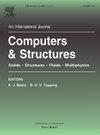Collocation-based robust variational physics-informed neural networks (CRVPINNs)
IF 4.8
2区 工程技术
Q1 COMPUTER SCIENCE, INTERDISCIPLINARY APPLICATIONS
引用次数: 0
Abstract
Physics-informed neural networks (PINNs) have been widely used to solve partial differential equations (PDEs) through strong residual minimization formulations. Their extension to weak scenarios via Variational PINNs (VPINNs) has been shown to lack robustness when the discrete and continuous-level norms are mismatched. Robust Variational PINNs (RVPINNs) address this problem by appropriately incorporating the Gram matrix but suffer from high computational costs due to the weak residual integration and the Gram matrix inversion. In this work, we accelerate RVPINN computations by using a point-collocation approach similar to PINNs, and by employing an LU factorization of the sparse Gram matrix. This leads to the proposed Collocation-Based Robust Variational PINN (CRVPINN). We validate CRVPINN on Laplace, advection–diffusion, Stokes, non-linear stationary Navier–Stokes, and linear elasticity problems in two spatial dimensions, demonstrating improved efficiency without compromising robustness.
基于配置的鲁棒变分物理信息神经网络(crvpinn)
物理信息神经网络(pinn)通过强残差最小化公式被广泛应用于求解偏微分方程(PDEs)。当离散和连续级范数不匹配时,它们通过变分pin (vpin)扩展到弱场景时已被证明缺乏鲁棒性。鲁棒变分pinn (Robust Variational pinn, rvpinn)通过适当地结合Gram矩阵解决了这一问题,但由于残差积分弱和Gram矩阵反演,计算成本高。在这项工作中,我们通过使用类似于pinn的点搭配方法和使用稀疏Gram矩阵的LU分解来加速RVPINN的计算。这导致了提出的基于搭配的鲁棒变分PINN (CRVPINN)。我们在拉普拉斯、平流扩散、斯托克斯、非线性平稳纳维-斯托克斯和线性弹性问题上验证了CRVPINN,证明了在不影响鲁棒性的情况下提高了效率。
本文章由计算机程序翻译,如有差异,请以英文原文为准。
求助全文
约1分钟内获得全文
求助全文
来源期刊

Computers & Structures
工程技术-工程:土木
CiteScore
8.80
自引率
6.40%
发文量
122
审稿时长
33 days
期刊介绍:
Computers & Structures publishes advances in the development and use of computational methods for the solution of problems in engineering and the sciences. The range of appropriate contributions is wide, and includes papers on establishing appropriate mathematical models and their numerical solution in all areas of mechanics. The journal also includes articles that present a substantial review of a field in the topics of the journal.
 求助内容:
求助内容: 应助结果提醒方式:
应助结果提醒方式:


